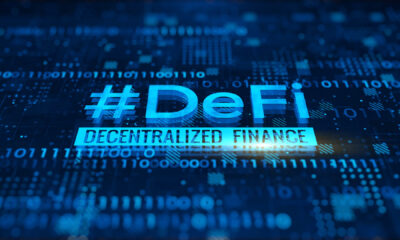The year 2021 has been pretty dynamic for decentralized finance or the DeFi market. After an impressive growth between January and May, the global DeFi market size plunged by 35% in just a few weeks and then recovered again, reaching new record highs.
A recent data showed the DeFi market size soared by 335% year-over-year to around $85bn this week, despite the 13% drop in September.
Record Valuation, Despite Two Sharp Falls in 2021
Decentralized finance offers various benefits compared to traditional financial services. Most DeFi apps run on the Ethereum blockchain, and they operate without a central control service over the entire system.
Through DeFi lending, users can lend out cryptocurrency, as a traditional bank does with an official currency and earn interest as a lender. As a result, interest rates are typically more attractive than traditional banks, while the barrier to entry to borrow is significantly lower compared to a traditional system.
In September 2020, the DeFi market size, as measured by the amount of cryptocurrency locked, stood at $19.5bn, revealed the Defipulse data. By the end of the year, this figure jumped to over $24.5bn.
However, after an impressive growth throughout the last year, the DeFi market exploded in 2021, reaching more than $50bn value in February. Over the next two months, the amount of cryptocurrency locked in the DeFi market surged to $68bn, an impressive 176% increase since the beginning of the year.
In May, the DeFi market hit a record valuation, with the total amount of cryptocurrency locked surging to $87bn on May 12. However, in the next two weeks, this figure plunged by 35% to $56.7bn. This could have been caused by significant changes in the price of almost 100 different cryptocurrencies, which may have led to investors pulling out. Another factor was the growing transaction fees of Ethereum, the main cryptocurrency of use within DeFi.
After dynamic June and July, the entire market continued growing last month and hit a new record valuation of $98.3bn on September 8. Although this figure slipped to around $85bn in the last three weeks, that is still $65.5bn more than in the same month a year ago.
Avalanche Became the Leading DeFi Token; Market Cap Soared by 6,500% YTD
As the world’s leading DeFi token, Avalanche witnessed a staggering market cap growth this year. In January, the combined value of all AVAX tokens in circulation amounted to $0.23bn. The CoinMarketCap data show this figure soared by 6,500% since then, reaching $15.3bn this week.
Terra witnessed the second-largest growth in 2021, with its market cap surging by 4,700% YTD to $14.5bn.
As the world’s second-largest DeFi token, Uniswap has seen its market cap surge by 965% in this period. Statistics show the combined value of all UNI tokens jumped to $14.9bn this week, up from $1.4bn in January.
Chainlink ranked fourth among the largest DeFi coins, with a market cap of $11bn, 144% more than in January. Wrapped Bitcoin follows with $9bn, showing an impressive 172% market cap increase since the beginning of the year.


 Forex3 weeks ago
Forex3 weeks ago
 Naira3 weeks ago
Naira3 weeks ago
 Billionaire Watch2 weeks ago
Billionaire Watch2 weeks ago


 Naira3 weeks ago
Naira3 weeks ago




 Naira2 weeks ago
Naira2 weeks ago




 Naira1 week ago
Naira1 week ago




 Naira4 weeks ago
Naira4 weeks ago
 Banking Sector4 weeks ago
Banking Sector4 weeks ago



















